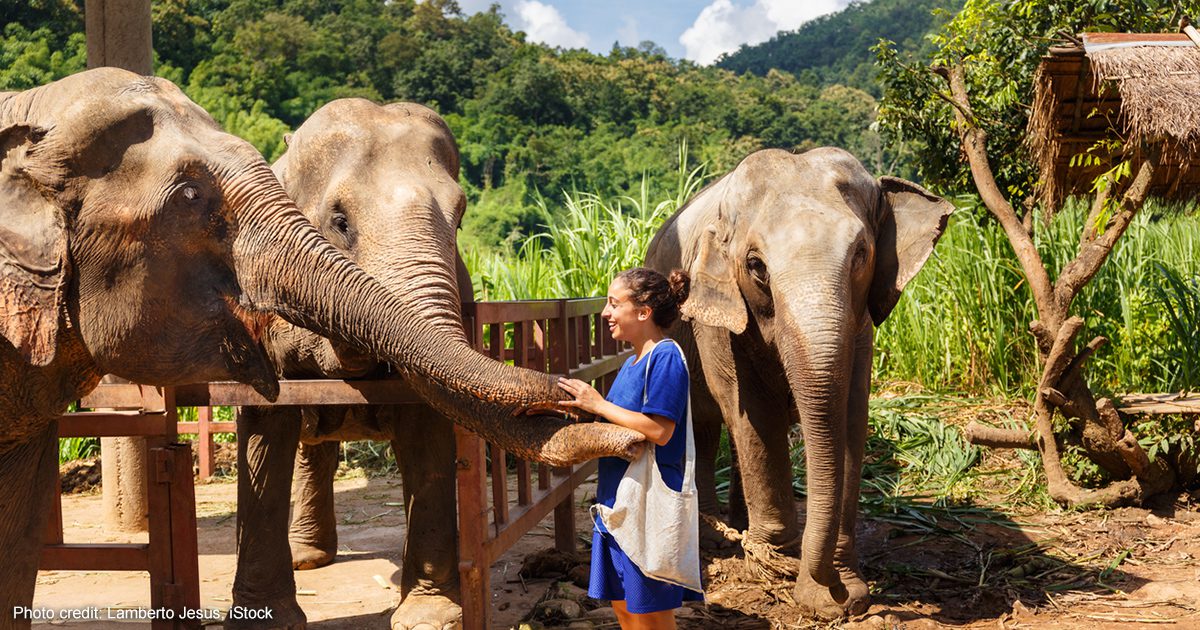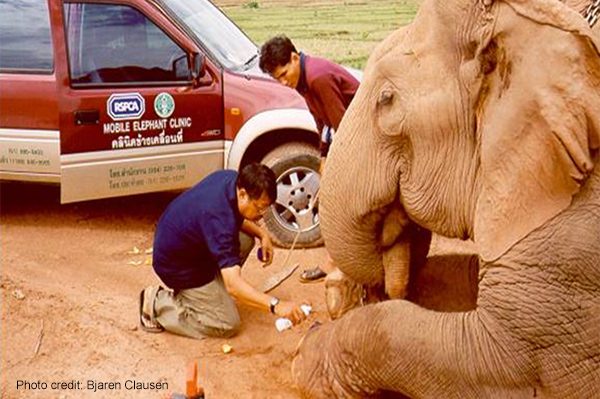
Sep 29, 2023 Elephant Care and Welfare in Southeast Asia Today: Part 3
After the ban on logging in Thailand, thousands of elephants became “unemployed.” Some roamed the big cities like Bangkok, where mahouts sold fruit to citizens and tourists to feed their elephants. A city is not a good place for an elephant, but the elephants could generate more money for the mahout in the big cities than they could earn elsewhere. Today, only a few elephants roam (illegally) in the cities. Most are in tourist facilities. When logging In the forest, the elephants could find food as well, but in the tourist camps, a typical owner does not own sufficient land to support as many as 80 elephants. Food such as grass, sugar cane, or banana plants has to be cut and brought to the elephants. Providing such fresh food may be challenging for the owner when there are few tourists.
The change from logging to tourism has not changed the duty of the mahouts to their elephants, but such developments in Thailand have affected the mahout institution. Mahouts came from elephant families with long mahout traditions of elephant keeping. A mahout typically followed in the footsteps of his father and grandfather, and becoming a mahout was a lifetime commitment. However, the income earned by a mahout cannot match the average income in Thailand today. Many now become mahouts for a short time. High mahout turnover leads to gaps in elephant management experience and knowledge. Knowledge and experience are essential for a successful mahout. Training, for example, the free courses provided by the National Elephant Institute in Thailand, has become even more critical.
Welfare for elephants is now, partly due to pressure from Western advocates, a big issue In Thailand. The five freedoms for animals, first described for farm animals (see FAWC 2009) in 1965, have been accepted as an overall guideline for elephant welfare and include “freedom from hunger and thirst, freedom from discomfort, freedom from pain, injury, and diseases, freedom to express (most) normal behavior, and freedom from fear and distress.”
The Thai government has modified and applied the guidelines for logging elephants to the tourist camps. Most of the elephant regulations are appropriate, but proper implementation lags. There are many good reasons to ensure good welfare for elephants. For example, an elephant’s price ($30,000-$50,000) should ensure that owners provide good care. The size of the animal and the avoidance of provoked aggression is another reason to ensure good welfare. While most Thai owners have a long family tradition of venerating their elephants, ingrained habits, a lack of knowledge, and sometimes a lack of funding can create barriers to implementing appropriate animal welfare.
Funding from urban Thai citizens and the Western world has opened up opportunities for improving elephant welfare. Evolving veterinary care for elephants is an excellent example of the importance of Western support. Over the last 25 years, Western NGOs have provided considerable funding (e.g., World Animal Protection, the RSPCA, Elephant Parade, Danish Animal Protection, and SPANA) to support a network of mobile elephant clinics providing free veterinary care for working elephants.

A mobile elephant clinic. The mahout is in complete control of the elephant. The veterinarian can work in safety.
Such clinics have been established in Assam in India, Myanmar, Thailand, and Laos. The mobile elephant clinics cooperate with local institutions, using local veterinarians who know the language and their local communities. Funding for medicine is essential. For example, an antibiotic to treat an elephant may cost as much as a mahout might earn in ten days. The additional technical experience provided by Western veterinarians is also helpful.
Mahouts and owners greatly appreciate free veterinary service and medicine. A veterinarian can also introduce animal welfare concepts and recommendations when caring for the elephant. For example, after successful treatment of an infection, the veterinarian can instruct the mahout on how to avoid future infections. Elephant hospitals supplement the mobile clinics. The facilities at a hospital permit the elephant and the mahout to stay together while cases requiring chronic treatment are managed.
A typical elephant practice in Thailand is not that different from a Western equine clinic. Typical cases may include sores from a harness or saddle and nutritional problems leading to constipation, often resulting from feed provided by an inexperienced mahout. For example, food such as the top of the pineapple plant, available as waste from the pineapple industry, requires a supplement of vitamins. In addition, when many elephants live together, parasite treatments are usually needed. A particular educational challenge may occur when treating wounds caused by the mahout.
Elephant herpes is becoming more of a problem for domestic (and zoo) elephants. The virus typically infects baby and very young elephants. Its onset is so fast that effective treatment is usually too late. We do not yet know how the virus spreads. It is present in adult elephants and often, but not always, infects a baby elephant during stressful situations, such as in cold and rainy periods.
The most severe cases of elephant injury occur when an elephant steps on a landmine. It is a terrible sight for the veterinarian when the victim finally arrives at the hospital after a long, limping walk through the jungle. However, successful treatment is possible. One must protect the undamaged foot from the pressure now experienced due to the animal’s body weight. The damaged foot is washed, maggots are removed, and after weeks, or more often months, of applying honey to the wound, the damaged limb heals, leaving a three-legged elephant. Some ask if it would be better to euthanize such an animal. However, in a Buddhist society, there is no tradition of euthanasia. Pain relief is a possible compromise, but such an option is expensive because the elephant may need pain relief throughout its life.
How can these veterinary efforts be evaluated? The clinics have just as many calls as before, but animal suffering has diminished. Fewer chronic cases require treatment, and more routine inspections provide educational opportunities for caregivers. The “Mahout box,” a small container with simple tools, such as eye spray, broom, soap, and ointment, lets the mahout provide treatments in acute situations until the mobile clinic arrives.
When veterinarians work with elephants during unprotected contact, they have to be very careful, especially if their treatment may cause pain for the elephant. The mahout has to be present, and he will warn if the elephant is aggressive. But if the veterinarian is careful, accidents can be avoided. Veterinarians know an elephant may be dangerous, but they usually feel safe working with the mahouts during the treatment.
Based on more than 20 years of experience treating elephants in mobile clinics as well as experience with animal welfare concerns in Western countries, we conclude:
- Initiatives to improve elephant welfare in Southeast Asia must consider the region’s long tradition of elephant management and consider the elephant’s well-being and the well-being of affected people.
- Elephants working for humans experience similar conditions to those of other working animals. An elephant’s health and social life generally appear to be better than other working livestock.
- Nevertheless, there is room for improvement in elephant caregivers’ training and traditional elephant management.
——————————————————————————————————
Bjarne Clausen, DVM, is a veterinary consultant for Danish Animal Protection (Dyrenes Beskyttelse). Taweepoke Angkawanish, Ph.D., is head of Thai Elephant Conservation, National Elephant Institute. They have around fifty years of experience in Asian elephant welfare, care, and medicine.


